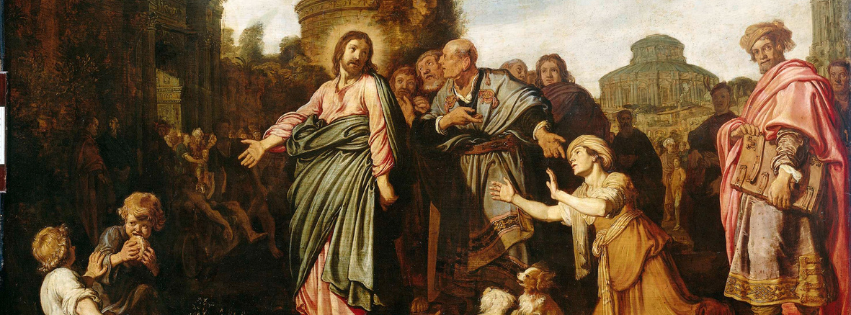Who Is Jesus?
In a world filled with countless voices, non-stop opinions, and conflicting ideologies, one question has echoed through the centuries, shaping history and challenging hearts: Who is Jesus? This isn't merely an academic inquiry or a historical curiosity. It's a question that carries profound implications for every person's life and eternity.
To truly understand Jesus, we must look beyond the surface-level descriptions of His actions or the time period in which He lived. While it's common to hear Jesus described as a good man, a moral teacher, or a revolutionary figure, these labels fall short of capturing His true essence. The Gospel of John, particularly its opening prologue, provides a framework for understanding Jesus that transcends human categories and reveals His divine nature.
The Eternal Word
John begins his gospel with a striking declaration: "In the beginning was the Word, and the Word was with God, and the Word was God." This echoes the opening of Genesis, immediately drawing a connection between Jesus and the creation of the universe. By using the term "Word" (logos in Greek), John is tapping into rich theological and philosophical concepts familiar to both Jewish and Greek audiences.
For Jews, the "Word of God" represented divine revelation and creative power. For Greek philosophers, "Logos" signified the rational mind behind the ordered universe. John boldly asserts that Jesus is the embodiment of both – He is the divine revelation of God and the very mind behind creation itself.
But John goes further. He doesn't present the Word as an abstract concept, but as a person – one who is both distinct from God ("the Word was with God") and fully divine ("the Word was God"). This sets the stage for understanding Jesus as fully God while maintaining a unique relationship within the Godhead.
The Creator of All Things
Building on this foundation, John declares, "All things were created through him, and apart from him, not one thing was created that has been created." This isn't just poetic language; it's a profound statement about Jesus' role in the universe. Every star, planet, tree, animal, and person owes its existence to Him. The implications are staggering:
Jesus, who would later walk the earth as a man, is the architect of the cosmos.
The same hands that would be nailed to a cross first formed humanity from dust.
Our very existence is intricately tied to the purpose and will of Jesus Christ.
This creative power of Jesus gives deeper meaning to our lives. We are not cosmic accidents, but intentionally crafted beings made in the image of our Creator. Our purpose is found in glorifying the One who gave us life.
The Light of Life
John continues, "In him was life, and that life was the light of men. That light shines in the darkness, and yet the darkness did not overcome it." Here, we encounter profound spiritual truths:
Jesus is the source of all life – both physical and spiritual.
His life brings illumination to humanity, dispelling the darkness of sin and ignorance.
The light of Christ is undefeatable, even in the face of seemingly overwhelming darkness.
This imagery of light and darkness resonates deeply with the human experience. We all know the oppressive weight of darkness – whether it's the literal fear of the dark or the metaphorical darkness of sin, despair, and death. John boldly proclaims that Jesus is the answer to this universal human struggle.
The light of Christ penetrates the darkest corners of our lives. No sin is too great, no situation too hopeless for His redeeming power. Even death itself cannot extinguish the light of His life-giving presence.
Implications for Our Lives
Understanding Jesus as the eternal Word, the Creator, and the Light of Life radically changes how we relate to Him:
Worship: If Jesus is fully God, He deserves our complete devotion and reverence. This goes beyond casual acknowledgment or occasional prayer. He calls for our wholehearted worship and obedience.
Identity: Recognizing Jesus as our Creator gives us a secure foundation for our identity. We are not defined by our accomplishments, relationships, or failures but by our status as beloved creations of God.
Purpose: Our lives find ultimate meaning in reflecting the glory of Jesus Christ. Every aspect of our existence – work, relationships, talents – can be infused with divine purpose when lived for His honor.
Hope: The undefeatable light of Christ assures us that darkness will never have the final word. No matter how dire our circumstances may seem, we can trust in the victorious power of Jesus.
Salvation: Jesus' divine nature is essential for our salvation. Only God Himself could bridge the infinite gap between sinful humanity and a holy God. The Word became flesh to rescue us.
A Personal Invitation
The Gospel of John wasn't written merely to provide information about Jesus. Its stated purpose is "that you may believe that Jesus is the Messiah, the Son of God, and that by believing you may have life in his name" (John 20:31).
This invitation extends to each of us today. Will we recognize Jesus for who He truly is – the eternal Word, the Creator of all things, the Light of Life? Will we entrust our lives to Him, allowing His light to transform our darkness?
The darkness of this world – sin, suffering, and death – can feel overwhelming at times. But take heart! The light of Christ shines in the darkness, and the darkness has not overcome it. Jesus, who spoke the universe into existence, who conquered death itself, offers you His victory today.
Trust in Him. Let His light illuminate your path. Discover the life-changing power of knowing Jesus, not just as a historical figure or moral example, but as the eternal Word of God who loves you and gave Himself for you.

